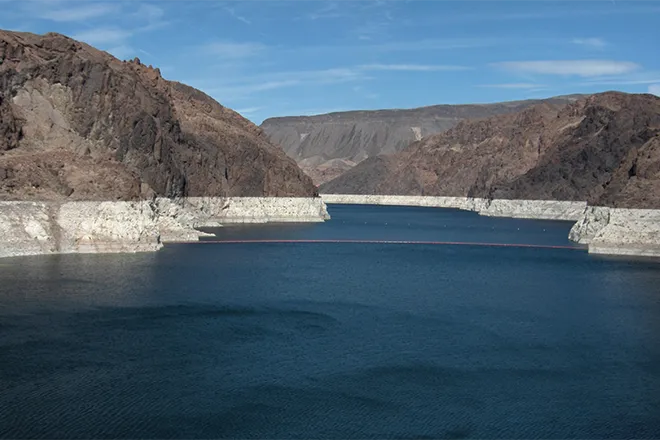
Daily Audio Newscast Afternoon Update - February 11, 2025
© INDU BACHKHETI - iStock-1336427297
News from around the nation.
A potent winter storm is thumping 1,500 miles of the US. Two more are right behind it; Amid scientists' warnings, Trump admin. sued over medical research cuts; Mississippi communities find local solutions to rural education challenges; CT groups rally against gas pipeline expansion.
Transcript
The Public News Service Tuesday afternoon update, I'm Mike Clifford.
The first of this week's back-to-back winter storms is bringing snow, ice and rain to a 1,500-mile stretch of the U.S. this morning, that from CNN.
They report another winter storm will hit some of the same areas in quick succession and dump the most substantial snow of the season over Chicago.
The third storm is the most serious flood threat Southern California has faced since January's devastating wildfires.
CNN reports it is snowing over parts of the Tennessee Valley and Appalachians.
There's more to come into Wednesday as the storm tracks east.
Washington, D.C. could get up to six inches of snow.
Meantime, a lawsuit has been filed against the Trump administration over its budget-cutting plans that target medical research led by colleges and universities.
Their allies warn of negative consequences for curing diseases, as well as local economies.
The suit was brought by Minnesota and 21 other states after the National Institutes of Health said it would follow through on orders to cut $4 billion through a grant funding formula for indirect expenses.
North Dakota isn't part of the legal case, but an analysis says the state could lose more than $3 million in research funds.
Ellie DeHoney with Research America says no matter the state, the pain will be quickly felt.
The suddenness of it is one of the ways that you degrade your research capacity.
Beyond the impact on finding cures for diseases like Alzheimer's, DeHoney warns of job losses at lab equipment makers and other supporting businesses.
A federal judge on Monday temporarily blocked the cuts while the case proceeds.
I'm Mike Moen.
And in rural Mississippi, where education disparities run deep, community leaders are stepping up to fill gaps left by limited resources and geographic isolation.
Mississippi has one of the highest child poverty rates in the nation, with one in three children living below the poverty line.
Yolanda Minor is Mississippi State Director for Save the Children.
She's at the forefront of efforts to improve education outcomes for children in some of the state's most underserved areas.
And some of the barriers are poverty, lack of access to high-quality early education, teacher shortages, and one of the biggest ones is geographic isolation.
One solution has been to partner with churches and school districts to create tutoring hubs in Quitman County.
I'm Tramell Gomes.
And next to Connecticut, where groups are rallying today against a natural gas pipeline expansion, Project Maple would extend Enbridge's natural gas pipeline stretching from New Jersey to Rhode Island, with sections running under Connecticut.
Governor Ned Lamont supported natural gas expansion in the state of the state, but Sina Wazer with the Sierra Club Connecticut Chapter says now isn't the time for this.
It is really important for our states to step up and to do better.
And I think especially here in New England, many of our states, including Connecticut, I would say pride themselves on being climate leaders.
And this is really a step in the wrong direction.
Most residents' feedback is negative, since this would increase statewide energy costs.
This is Public News Service.
Next to Indianapolis, where overdose deaths are surging, hitting Black men born between 1951 and 1970 the hardest.
Data shows deaths among this group are nearly three times the city's rate and almost ten times the national rate.
Hoosier Nate Rush started battling addiction with marijuana when he was 12 years old.
By 17, he turned to heroin. 30 years later and in recovery, Rush trains peer specialists and supports Black men facing similar struggles.
A lot of people that are 50 to 70 count themselves out.
There's always hope.
You might have been to the penitentiary 10 times.
It still don't mean that you are that.
Hope is so powerful.
Rush is former executive director of the now-closed Bethlehem House in Indianapolis.
This story was produced with original reporting from Darian Benson and Mary Claire Malloy for Mirror Indy.
And a new study by the Rural Health Research Center at the University of Minnesota reveals that medical debt in rural Minnesota has an impact far beyond the bills many patients struggle to pay.
Center co-director Carrie Henning-Smith says it isn't simply an issue of health care facilities passing along big bills to patients who must then shoulder the burden.
This is really an issue that impacts individual patients, whole communities, and health care facilities.
And I think smaller, rural facilities that have a more tenuous bottom line are some of the most impacted.
Henning says the matter is exacerbated by under-insurance and insufficient coverage from insurance companies, including Medicare and Medicaid.
She adds that financial strain can lead to hospital closures, which in turn harms the local economy and reduces access to care.
Her story was produced with original reporting from Liz Carey for the Daily Yonder.
For Public News Service, I'm Mark Richardson.
And finally, some Ohio lawmakers are advocating for surveillance cameras at highway rest stops, aiming to enhance safety and curb human trafficking.
A previous effort, House Bill 473, would have allocated funding for the initiative, but the bill failed to advance.
Representative Lauren McNally says there's a strong case for revisiting the proposal, especially in the Toledo area, which is one of the number one places in the country for human trafficking.
Anything to curb that trend, we're always looking at from a legal perspective at the statehouse and from a police perspective.
But it also does more than that.
When we talk to the Turnpike Association, they've actually been able to solve and stop crime.
Still, concerns about privacy have led some to oppose the effort.
The ACLU of Ohio has voiced objections, arguing the bill could set a precedent for broader government surveillance.
Farah Siddiqui reporting.
This is Bob Clifford from Public News Service.
Member and listener supported.
Hear us on great radio stations on your favorite podcast platform.
Find our content and trust indicators at publicnewsservice.org.

















